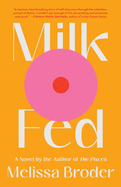
Rachel, the heroine of Melissa Broder's agitated sophomore novel, Milk Fed, is a need machine. At 24 years old, she has a desk job at a talent agency in Los Angeles, a gym membership she uses daily, a therapist she meets with weekly and deep-seated mother issues that express themselves through obsessive, highly controlled food rituals and bizarre sexual fantasies. Shaped by a lifetime of maternal nit-picking and neglect, Rachel's diet consists of nicotine gum, low-fat chocolate muffin tops and the small dopamine hits garnered when co-workers and acquaintances tell her that she looks too thin. Her compulsions, which set the novel's pace to a manic tempo, emanate from a deep reserve of endlessly unmet desire.
During a 90-day therapist-prescribed "emotional detox" from her mother, Rachel finds that her mother's critical voice becomes muted when a kind, overweight frozen yogurt chef enters her life. Miriam smokes clove cigarettes, watches old movies, drinks massively caloric fruity cocktails and eats whatever she wants, as long as it's kosher. Blessedly unburdened by the neuroses that govern Rachel's life, Miriam becomes a multi-faceted object of obsession for her: first, as the embodiment of her worst fears, then as a mother figure and, finally, as a lover.
"More than anything, all I'd ever wanted was a total embrace, the embrace of an infinite mother, absolute and divine," Rachel explains. This visceral and transporting portrait of self-denial and its twin, excess, sheds light on the psychology underpinning the American obsession with weight. Daring, chaotic and pleasingly heretical, Milk Fed is the work of a total pro. --Emma Levy, freelance writer

